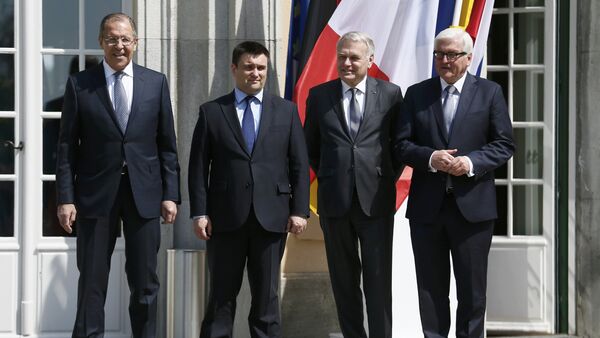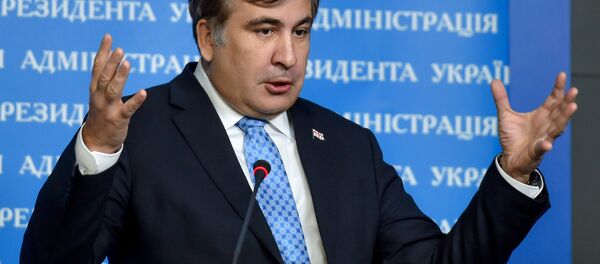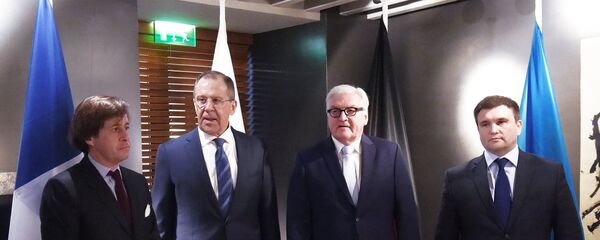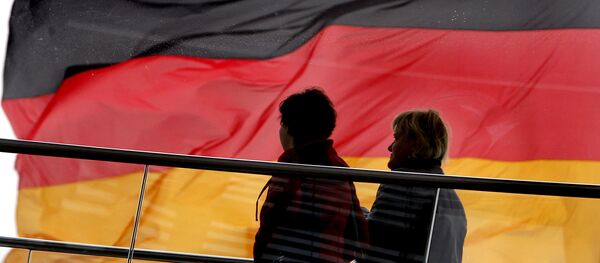On Thursday, Kremlin spokesman Dmitri Peskov said that Russia "regrets" Ukrainian negotiators' tendency to repeatedly switch their positions, adding that Kiev seems to be "do[ing] everything to avoid fulfilling their obligations." Peskov's remarks were echoed by Deputy Foreign Minister Grigory Karasin, who complained that Ukrainian authorities are "either unwilling or unable to move forward in the implementation of the Minsk agreements."
#Karasin: Kiev authorities are either unable or unwilling to move forward in the implementation of Minsk agreements https://t.co/8qi8Ozzr2F
— MFA Russia (@mfa_russia) 11 мая 2016 г.
Commenting on the latest meeting, Ruslan Ostashko, the co-founder of the independent online news and analysis journal PolitRussia, suggested that Russian officials' frustration isn't entirely justified.
"Russian media and commentators react to these meetings rather coolly, berating the European ministers for their unwillingness to put pressure on Kiev. This is understandable. At the same time, one cannot ignore the strong dissatisfaction that was expressed by supporters of the Ukrainian government, who see the foreign ministers of Germany and France as 'evil, Putin-allied traitors' who, instead of introducing new sanctions against Russia, have suddenly begun demanding that Kiev fulfill the agreements which it had signed."
"It's no wonder," the journalist wrote, "that European diplomats talking around the water cooler have complained that attempts to achieve progress in Ukraine are reminiscent to an attempt to 'pushing on a string'."
"When the Minsk agreements were first signed, fears emerged among the [Russian] expert community that demands would be made for Russia to fulfill its obligations (even though Moscow did not sign on as a party to the conflict), while Kiev would not be required to do anything, or to only formally fulfill its obligations. Kiev, in fact, was counting on this, as evidenced by Ukrainian lawmakers' approval of an openly derisive law on the status of Donbass."
But their fears didn't come to pass, Ostashko noted. "Russia, for show, gets scolded, but when we look at the topics which are discussed in the negotiations, the majority of them are related to the Ukrainian side, including things like amnesty, amendments to the constitution (i.e. federalization), and the lifting of the economic blockade against Donbass."
The tendency to put increasing pressure on Ukrainian authorities is not new, and is making them increasingly nervous, the journalist added. "After US Assistant Secretary of State Victoria Nuland's recent visit to Kiev, and a meeting of Ukrainian lawmakers with European colleagues, the participants of these meetings complained to Ukrainian media about 'being pressured from the West'. The position of the European side can be described as follows: 'if the Ukrainian side does not show progress on implementing its obligations, arguments in favor of maintaining sanctions against Russia will lose their relevance."
At the same time, Ostashko wrote, claims by Ukrainian and European experts and media that "Moscow is insisting on the implementation of the Minsk agreements so that sanctions can be lifted are nonsense."
"Our official position was set a long time ago and is perfectly clear: Russia is not conducting any negotiations on sanctions, nor is there any linkage to them and the situation in Ukraine. The Europeans themselves created a problem for themselves – let them solve it. As Russian farmers correctly joke, 'it would be nice to have another two-three years of sanctions, and after that we will become truly self-sufficient.'"






